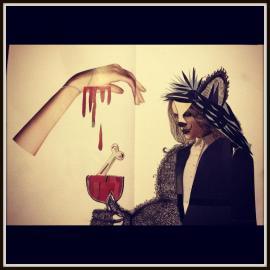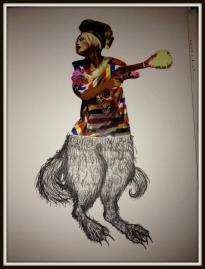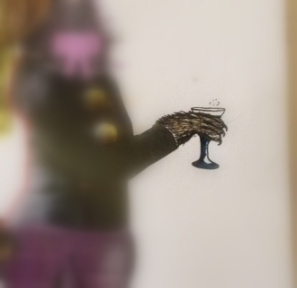Thomas Brown's Blog, page 14
November 25, 2012
Artists’ Corner – Jemma Gorrod
Jemma Gorrod is an artist from Witney, Oxfordshire. One of her favourite art forms is collage, so when she agreed to do some artwork inspired by my upcoming novel, it was this form that she chose to work in.
Jemma graduated from De Montfort University, Leicester, in 2011 with a BA degree in Graphic Design and Illustration. Her artwork is typically surreal, striking and characterful, whether she is re-imagining a classic book cover or critiquing society. The collage style that she so enjoys is versatile and eye-catching and I feel very fortunate to have her on board RE: her artistic talents.

I am trying to build an online portfolio of images and art pieces related to my novel, LYNNWOOD, so Jemma’s collage preferences (and her accomplished eye for them) make the perfect addition. I think she has done an excellent job with the pieces she has produced so far. She has developed the themes that resonated with her the most into an abstract and somewhat grotesque set of images that sing of the inherent nature of Lynnwood’s residents, and perhaps the inherent nature of all of us, inside and out…


November 19, 2012
Developments and Thanks
A brief update to announce that Sparkling Books has revealed a new page for LYNNWOOD on its website. It is still early days but you can read a little more about the book there, including an encouraging foreword from chronicler of the New Forest Philip Hoare. I feel very proud and excited to see the book and the project coming together, and can’t wait for June when you will have the opportunity to read it for yourselves.
“The unthinkable is happening in Lynnwood – a village with centuries of guilt on its conscience.”
I would also like to say a big thank you to everyone who has read, followed or otherwise supported my writing to date. So much is down to encouragement and I can’t convey my gratitude for those of you who have continued to spur me on. It is easy to become disheartened by anything that does not instantly yield results, especially when we are part of a culture that glorifies short-cuts and speedy success. As any grounded writer will tell you, our craft is not about fame or fortune. It is about doing something that we love, about art and about staying sane in an otherwise maddening world. So thank you.


November 8, 2012
“To live a creative life we must first lose the fear of being wrong.”
I think this quote, by Joseph Chilton Pearce, translates well into all areas of our lives. With so much pressure to succeed, to win and to be permanently right, it is an invigorating and refreshing thing not to fear failure. There is nothing wrong with being wrong, except being frightened of it. We fail so that we learn. This knowledge and understanding develops us (and our writing) so that with every mistake we become more experienced and more adept.
Our lives depend on these mistakes. They humble us, so that we don’t overreach ourselves. They teach us, so that we become wiser. They show us that when things go wrong, we need only pick ourselves up and write about it, in order to carry on.
Every day we make decisions. Some of these are as simple as what we’re going to eat for breakfast, or what we would like to watch at the cinema. Others are more obviously life-changing. It is important that, no matter what, we take these decisions in our strides. Some people live their whole lives in fear of embarrassing themselves, or seeming wrong. It is this fear that holds them back, not the being wrong itself. Even a seemingly wrong decision opens up new avenues with new opportunities for us to take. We are always moving forwards, always.
So go, be brave, live and write. What else is there to do?


October 26, 2012
‘The Lurking Fear’
Having recently reread the title story, and in the interest of the season, I thought I would share some thoughts here. Those of you who have read ‘The Lurking Fear’, by H.P. Lovecraft, will know already the dark majesty of the story. Those of you who have not have some catching up to do, it would seem…
The premise of the story is quite simple: the narrator, having heard rumours of a horror on Tempest Mountain, visits the Martense Manor at said location with the intention of uncovering what is occurring there. The narrative is broken down into four serials, in which form it was originally published through Home Brew.
Where the story works so well is in the nature of the horror it explores. Lovecraft marries fears of the dark, the night, storms, claustrophobia and the unknown, to name but a few, into an atmospherically arresting story that grips its readers. These fears are innate and primitive, ensuring that his story strikes chords with as many readers as possible. The impact of these psychological tricks is evidenced by the number of spin-offs, stories and films inspired by ‘The Lurking Fear’. My favourite of these is British horror film The Descent, although that is perhaps a post for another time.
Whilst much of the horror in ‘The Lurking Fear’ is atmospheric, Lovecraft does not disappoint us when it comes to the climax of the story. I will not disclose spoilers here for fear of ruining the ending for others, but I will say that the nature of the revealed horror is repulsive in every respect. Like the dark and the storms and the claustrophobia that he explores, the horror plays on primitive, psychological fears and reflexes, ensuring the readers’ revulsion.
The story fascinates me because it terrifies me. Its use of very real fears to accompany the weird is a technique that should not be ignored, especially when considering the literary merit of horror and means of integrating horror elements into literary and/or contemporary mainstream fiction. Certainly it is worth trying to emulate, if any writers fancy their hand at experimenting with its impacts. It is not just monsters that scare. It is the darkness; in the sky, beneath the ground and inside us all. And if that darkness turns us into monsters, then so be it.


October 24, 2012
Scheduled!
We have a date, ladies and not-so-gentlemen! My upcoming novel, LYNNWOOD, set in a fictional village in Hampshire’s New Forest, is due for release 17/06/13!


October 23, 2012
Let’s Talk Genre
It is the age-old debate of literary VS. genre fiction: which kind of writing comes out on top? Both camps have their fanatics. The struggle is vicious is ugly. And many fine stories have been wounded during the war. But why?
On one side we have genre fiction. Generally speaking (and there are always exceptions), it is plot-driven, characterised by its fast past, twists-and-turns, narrative devices and thematic predisposition, dependent on the kind of genre under scrutiny (horror, romance, mystery, adventure). It is fiction designed to entertain.
On the other we have literary fiction. Once again I speak generally, but here the focus lies on character development, structure and emotion, at the expense of plot and drive. It is the literature of thought and feeling and philosophy, making it more high-brow than genre fiction, but slower, less approachable and less urgent.
Both kinds of writing have advantages over the other, and both have their disadvantages. Fans of genre fiction might say literary writing was boring. Fans of literary fiction might say genre was trashy. Neither of these things are objectively true, of course. What neither side seems to realise is the potential for greatness, when the lines between the two are blurred.
Give your literary voice a plot drive. Slow the action/horror/romance for a chapter and listen to the characters. When does literary become genre, and genre literary? I’m not so sure it matters any more, and certainly – and I feel very strongly for this, having been subject to both prejudices in the past - a story shouldn’t suffer because somebody feels it falls into the wrong camp. The usefulness of genre labels – literary, genre or otherwise – extends to the grouping of similar books on the bookshelf, and should stop there.
The market for literary fiction is dwindling, whilst a lot of genre fiction could benefit from an infusion of character development and eloquence. By consolidating the two, I think they could both benefit. Is there anything to lose from trying?


October 21, 2012
Sneak Peek
A glimpse of some WIP artwork to accompany the release of LYNNWOOD, courtesy of the talented Jemma Gorrod. They are suitably blurred, so as not to give much away. More pictures and information about Jemma to follow, when the artwork is finished. I hope they whet some appetites!









